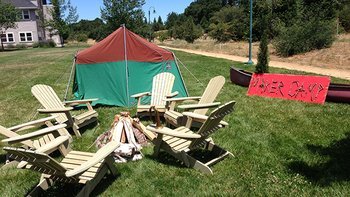Summer is officially here, and for many parents and kids that means summer camp. Many of us grew up with wonderful memories of summer-filled days at camp. Songs by the campfire, canoe races and a sundry of other events and new friends fill our minds with good memories. Today, sending your child to camp involves an understudy of camping knowledge and skill. There is an every expanding list of possible camps; general camps and ones that can help enhance any weakness your child may need help strengthening. It doesn’t matter if your child is going to a baseball camp, math camp, science camp or a basketball camp, they all have a long list of what kids should and shouldn’t bring. A shorter list is available of dos and don’ts for parents.
Most camps are meant for kids, not for their parents. However, if you are a first timer sending your child away to a summer camp, you will note a heightened sense of anxiety. How do you know if your child will be okay? Are you sure this camp will address their individual needs? What if there is an emergency? All sorts of possible crises run through your mind. There are always things that can happen, but most of them can also happen almost every day of your child’s life— with or without camp. Your heightened sense of anxiety may, however, affect you and turn you into a model parent for what NOT to do when your child is at camp.
Below are a few of the dos and don’ts for being the type of camp parent your child won’t be embarrassed to travel home with:
- Let go and let your child learn new experiences with trained counselors. Your child has an opportunity to return from camp feeling accomplished and more self-assured. You can help facilitate this by reassuring your child before they leave for camp and reminding them of other times they felt unsure or insecure and did wonderfully. Also, reassure them you will be there if they need you. Parents who cannot let go and allow the camp counselors to teach their children new skills and offer them opportunities stifle their child’s emotional growth.
- Communicate with them as appropriate. Camps have rules about ways and how much to communicate with the camper. Parents who follow these rules and make sure their child has the appropriate communication are sending their child the message that they trust them and have confidence in them. Parents, who try to over communicate, or indulge their child with gifts throughout the week, send their child the message that they are not like the other kids and need more attention. This prevents the child from bonding with the other campers and learning to self soothe when they feel stress or homesick. Camp counselors are instructed on healthy ways to de-stress children. Allow your children the opportunity to learn these and more healthy tips.
- Having your child away at camp can also be a relationship retreat for you and your spouse. Take advantage of being a couple again and enjoying late dinners or evenings spent out. When your child comes home full of new experiences to talk about, you will both be eager to listen. Your relationship will be stronger and closer. Don’t spend the camp week or month feeling anxious and alone without your child. A camp is an opportunity for both the child and the parents to grow.
My daughters both went to camp and would come home with stories to tell and memories they still smile and talk about. The experience has them humming a tune they learned long ago. It was also a wonderful week for their dad and me. We were able to be a couple again, which restored and helped our marriage. Summer camps are part of a child’s history and one they will pass on to their children. Ensuring your child has a wonderful experience begins with embracing the camp, following the rules and trusting your child’s ability—as well as yours— to let go and thrive.
Mary Jo Rapini, MEd, LPC, is a licensed psychotherapist and co-author with Janine J. Sherman, of Start Talking: A Girl’s Guide for You and Your Mom About Health, Sex or Whatever. Read more about the book at www.StartTalkingBook.com and more about Rapini at www.maryjorapini.com.
